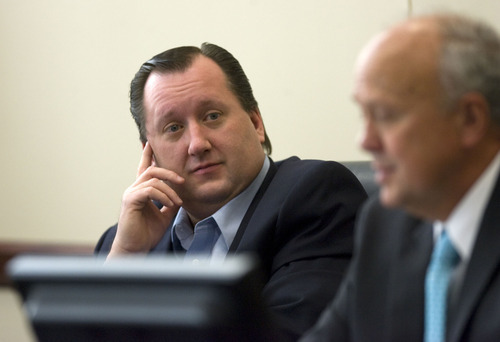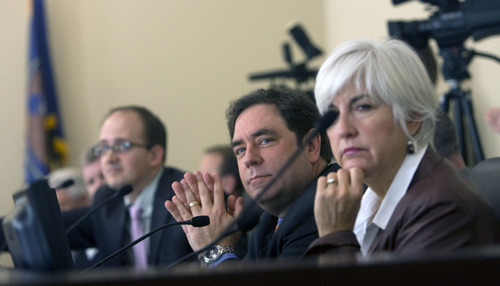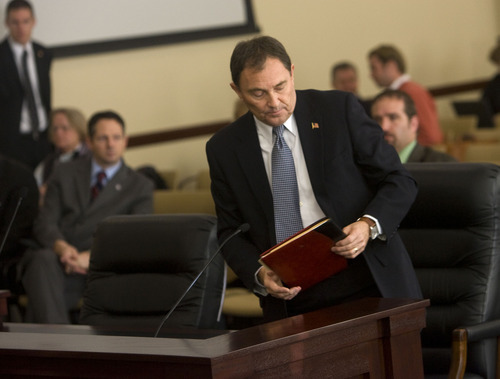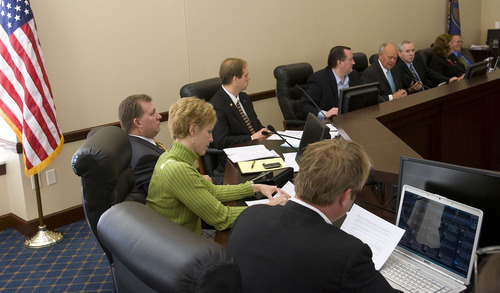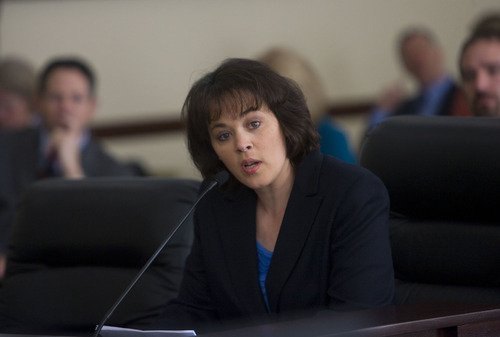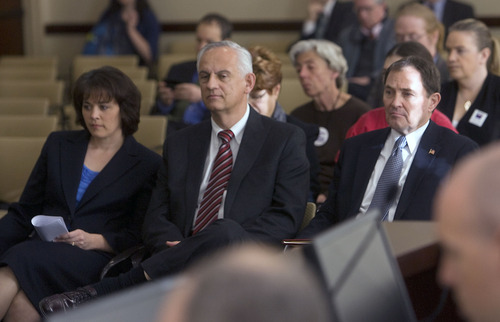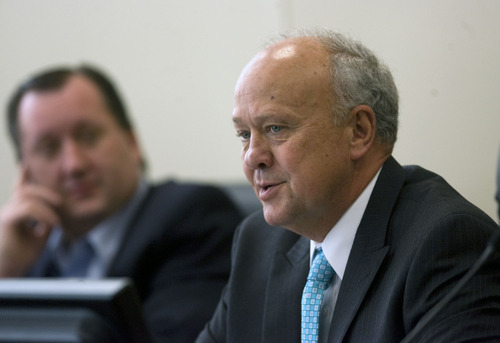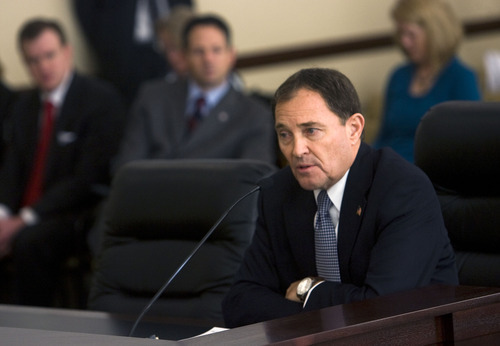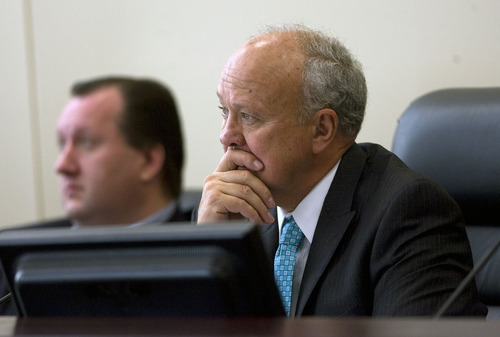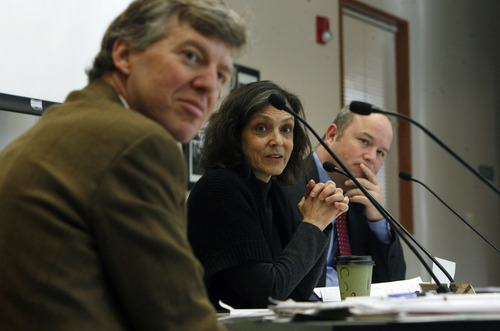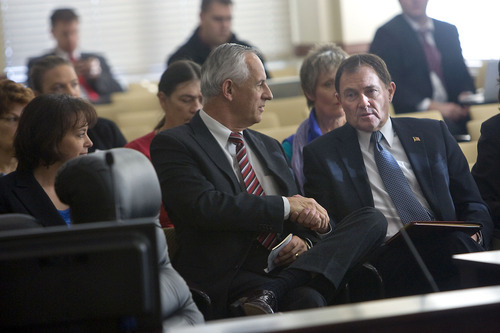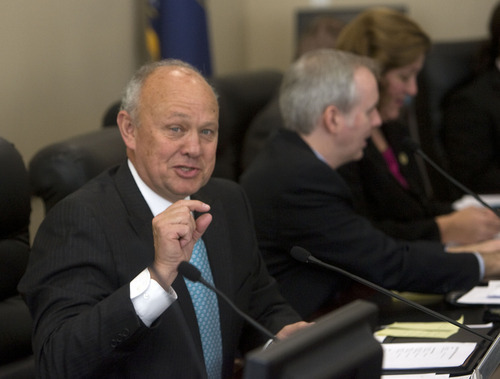This is an archived article that was published on sltrib.com in 2011, and information in the article may be outdated. It is provided only for personal research purposes and may not be reprinted.
Utah's decades-old open-records law is "creaky" and, like any statute, it isn't quite perfect, but a new law that would replace it raises "thorny problems," members of a working group charged with improving the law said Wednesday.
But the tension over how to do that surfaced almost immediately in the GRAMA Working Group's first meeting, with lawmakers bristling over where to draw the line between their public and private lives — and criticism that some voices were "notably absent" from the panel.
"After all, the reason you are all here is not because the media made a big deal about [the new law], but because people like me did," said Lorna Rosenstein of Water Watch of Utah, who was among a handful of activists in the audience at the Capitol.
—
Records experts left out • At a separate meeting on Wednesday, one of the most well-versed groups on how the current Government Records Access and Management Act (GRAMA) functions — the Utah State Records Committee — also complained about being left out of sweeping changes made to records access, as lawmakers drafted and passed HB477.
The quasi-judicial committee, created 20 years ago, hears appeals of government entities' refusals to release records.
"They've left us out of the entire process," said committee member Scott Whittaker, who wondered whether the oversight was because lawmakers disagreed with the panel's decisions. "They're trying to set it up so we wouldn't have an option [of releasing records]."
On Wednesday, the committee sent a letter to Gov. Gary Herbert and legislative leaders asking for a seat on the 25-member working group.
"Committee members are familiar with the difficult issues of GRAMA related to classification of records, fees and costs and the weighing of public and private interests," wrote Betsy Ross, the records committee chairwoman.
The drafter of HB477, Rep. John Dougall, R-Highland, didn't immediately return messages about the State Records Committee's concerns. Sen. Lyle Hillyard, R-Logan, who sponsored the bill in the Senate, said he wasn't aware of the committee's existence, which is why he didn't ask for its input.
"No one mentioned that to me," he said. "I don't remember anyone saying there is a records committee [and] you ought to consult with them."
During the working group's two-hour meeting, Chairman Lane Beattie tried to assure interest groups they will be able to participate throughout the process during open meetings, via Twitter (@grama) and on an upcoming website. Beattie also said he expects the group will turn to state archive staff members for guidance on records management.
Beattie set an aggressive one-month time frame for sorting through the myriad issues surrounding the records law. Its starting point is outlined in 36 questions prepared by legislative staff, ranging from what costs to include for producing documents to whether personal notes of a government official are public records.
"Emotions on this issue have gone to the extreme in every area," he said. "I hope that, in the next weeks, we have an opportunity through the media and everyone else to help people understand why it's so important and how changes came about."
The new law, set to take effect on July 1, requires a requester to prove records are public, protects many types of electronic records from disclosure and expands fees for providing records.
But the law may be recalled. The Legislature will meet Friday in a special session to consider Herbert's recommendation that HB477 be "repealed and replaced" with a proposal that emerges from a more open process.
Herbert told the working group Wednesday that he sees three issues at the heart of its coming discussions: protecting the public's right to know; safeguarding the right to privacy; and examining costs associated with providing access to records.
"I believe a good process will lead to a good outcome," Herbert said.
The current open-records act became law in 1992 after a three-year public discussion. Since then, the law has been amended at least 10 times and has been the target of 160 other bills aimed at revising it, said John Fellows, the Legislature's general counsel.
HB477 sailed through both houses 72 hours after it was introduced, but Dougall, a working group member, denied Wednesday that his bill was a "last minute" end run around a public debate. He said his intent was to "elevate this issue" and draw attention to needed changes in the records law. Now he plans to introduce a bill to repeal the law on Friday.
—
Uncertainty • Confusion abounds on the current open-records law, as well as what HB477 does, a point made at both meetings on Wednesday.
State Records Committee member Ernest Rowley said he has yet to hear clear examples of how the law isn't working.
"Really, we don't know what the problem is that is trying to be corrected," Rowley said.
Some lawmakers have said the current law doesn't address new technology such as voice mail, text messages or Internet chats. Back when GRAMA was passed, a key point of debate was about how to deal with notes kept in day planners.
Sen. Steve Urquhart, R-St. George, called the technology issue a "red herring" — a point also made during the State Records Committee meeting.
Committee member Lex Hemphill said GRAMA was designed to be flexible in dealing with new technologies, adding that he was unsure what change prompted the sudden overhaul. "Technology is going to change in two years, five years, 10 years," Hemphill said. "Are they going to keep changing [the law]?"
The issue of distinguishing between what's public and what's private surfaced repeatedly in the working group's meeting.
Urquhart suggested that public officials "should expect anything to do with the office is public," but separating public and private content on devices used by lawmakers, from cellular phones to iPads, may be a stickler.
"Should your tax return land on the front page of The Tribune?" Sen. Curt Bramble, R-Provo, asked social-media expert and group member Jesse Stay, who advocated that anything done in an official capacity on state-funded devices should be public.
—
Public vs. private • Sen. Stuart Adams, R-Layton, said he recently had to answer a GRAMA request that required a staff member to read each email to determine if it dealt with public business or private matters.
"I think that is a very significant violation of the Fourth Amendment," Adams said.
Hemphill pointed out the records committee has protected text messages in some cases, including denying a request in January from The Salt Lake Tribune for text messages between a Utah Department of Transportation employee and the president of a contracting company that won the $1.1 billion Interstate 15 reconstruction bid. The two were in a romantic relationship, and the records committee deemed their emails to be "personal communications."
Stay suggested lawmakers use private email and cellphones for their personal business. But that raised another dilemma.
"Are we going to trust legislators about what's on their private versus public devices?" asked Rep. Brian King, D-Salt Lake City.
Another question that got an early airing by the working group: Are lawmakers personal notes records? Two members said that the current law already exempts personal notes, but Fellows said one court ruling has determined government officials have no expectation of privacy.
"None of these issues are simple, and all of them have shades of meaning," he said.
Blogger and working group member Jason Williams said lawmakers are entitled to a "human amount" of privacy under law, but of more concern is who must prove whether a record is public.
"If lawmakers aren't assuming the burden of proof, the public is," he said, "and that should be the focus, rather than the trials and tribulations of lawmakers."
What does HB477 do?
Repeals the legislative-intent language of GRAMA, which had recognized the public's interest in obtaining records and directed government to favor public access in a balancing test with privacy interests. Requestors must now show it is in the public interest to release some records by a preponderance of evidence.
Exempts the state Legislature from disclosure of most records.
Prohibits text messages, voice mails, instant messages and video recordings from disclosure, in most cases.
Gives government agencies more time to respond to requests if the requester seeks a "substantial" number of records.
Allows entities to charge fees that include the costs of overhead and administration, in addition to the actual cost of providing a record.
Exempts records created for "reasonably anticipated" litigation. —
More online
O To read the 36 questions the working group is considering, visit http://tinyurl.com/GRAMAqs.
To watch an archived video of the first working group session, visit http://tinyurl.com/GRAMAsession1.
To monitor the discussion on Twitter, follow hash tag #GRAMA. The Alliance for Unity, a group of business, civic and religious leaders, issued a statement Wednesday calling on the Legislature to repeal the new records law.
The Alliance said that while there may be merit in modifying some out-of-date aspects of the law, that work should be done in public.
"Attempts to deny the public's access to open records are not in the public's interest, regardless of one's political beliefs," said the alliance in the statement. "Furthermore, such attempts are not in the interest of freedom."
Alliance members include: Robert "Archie" Archuleta, community activist; Pamela J. Atkinson, community activist; Elder M. Russell Ballard, The Church of Jesus Christ of Latter-day Saints; Ralph Becker, Salt Lake City mayor; Cynthia Buckingham, executive director, Utah Humanities Council; the Rev. France A. Davis, Calvary Baptist Church; Spencer F. Eccles, chairman emeritus, Wells Fargo Bank; Jon M. Huntsman, chairman, Huntsman Corp.; Norma Matheson, former first lady of Utah; Alexander B. Morrison, executive director of the alliance; Dinesh Patel, managing director, vSpring Capital; Harris H. Simmons, president, Zions Bancorporation; Dean Singleton, publisher, The Salt Lake Tribune; the Most Rev. John C. Wester, Catholic Diocese of Salt Lake City; and Michael K. Young, president, University of Utah.


